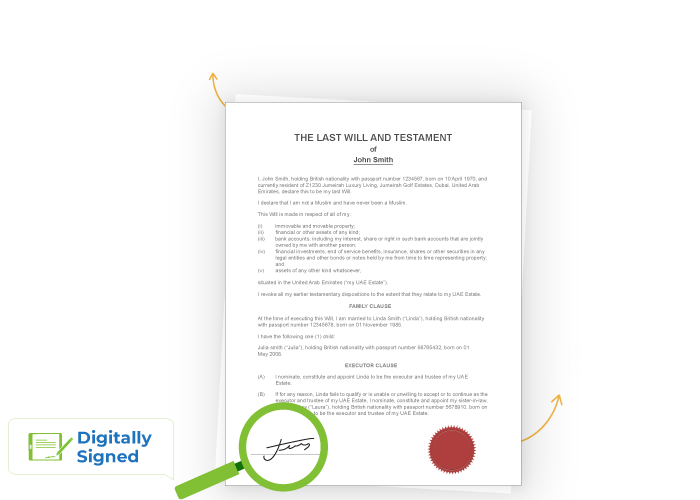1. Choose who writes your Will wisely
You may be glad to know that a Will can be written by anyone and you can write your own Will. However, given that this is perhaps the most important document that you will ever sign during your life, it may be too big a risk to write your own Will and eventually your family finding out after your death that the Will written by you was not enforceable. Will writing is a technical area of law and professional legal assistance should be sought to ensure that the document is correctly written in compliance with the applicable laws in the UAE. To ensure this, you should choose a professional law firm (such as Legal Inz) who is duly registered with the DIFC Courts Wills Service in Dubai to write Wills for non-Muslims.
2. Choose your beneficiaries
A beneficiary is a person who is entitled to receive your estate after your death. Choice of a beneficiary is perhaps the first thought that may have crossed your mind when thinking about making a Will in the UAE. You should declare the beneficiaries of your estate in your Will in clear terms. You can practically choose anyone as your beneficiary. For example, we have seen that married couples in Dubai and across the UAE give 100% of their estate to each other. If both of them pass away together, the couples typically nominate their children as the alternate beneficiaries with distribution of estate in equal shares. No matter who you choose as your beneficiary, the names of your beneficiaries and distribution mechanism should be spelt out in clear and unambiguous terms in your Will.
3. Appoint your executors
An executor is a person who will have your Will executed in line with your instructions after your death. Given the nature of this role, a person who is being appointed as an executor should be someone who is either a close family member or a close friend. It is always better that you appoint someone who is willing to play this role, is present in the UAE and has some knowledge of how things work in the UAE. In practice, we have seen that married couples appoint each other as executors in their respective Wills. You should consider appointing at least one (1) or two (2) alternate executors to cover an unlikely event of you and your spouse passing away together.
4. Appoint guardians for your minor children
A guardian is someone who will be responsible for the upbringing and care of your minor children below the age of 21 years after your death. In the absence of a Will, the mother only keeps custody of minor children whilst the court may appoint a male member of husband’s side of the family as the legal guardian. The custody and legal guardianship are two (2) different concepts in the UAE. The custodian of the minor children only keeps the custody and the legal guardian has the power of make legal and financial decisions about the minor children. If two (2) different people play these two (2) roles, there could be potential conflicts. To avoid this, the mother should be appointed as the legal guardian of minor children through a Will. You should also appoint at least one (1) or two (2) alternate guardians to cover a situation where both parents pass away together.
5. Alternate guardians for female children
If you have any female child and you intend to appoint a sole male alternate guardian for her, you may only choose your or your spouse’s brother or father for this role. If you wish to appoint a male guardian (for your female child) from amongst any other relatives or friends, the appointment should only be made in a way that such male and his wife should act as joint guardians. You may, however, appoint any male as a sole alternate guardian for your male children.
6. Appoint interim guardians for your children
You should consider appointing interim guardians for your children to cover a situation where you and your spouse pass away together. The role of an interim guardian (also sometimes referred to as temporary guardian) is to act as the guardian of minor children on an interim basis in a situation if the appointed alternate guardians live outside the UAE. The appointment lasts until the time the alternate guardian arrives in the UAE to take custody of the children. Interim guardians should be couples from amongst close relatives or family friends in the UAE.
7. Make specific legacies, if required
If you wish to give any specific items (such as specific real estate property, watch, ring etc.) to anyone, you can nominate the beneficiary of such item(s) in the Will by clearly outlining the details of the item to be given as a legacy. If you wish to give any amounts of cash to someone, you should outline the amount of cash along with the details of the beneficiary. You should note that these specific legacies will be distributed to your beneficiaries and the remainder of your estate will be treated as the 100% of the estate that you may have opted to give to your spouse or any other beneficiaries.
8. Give funeral instructions
You may want to specify your funeral instructions with the method and place of your funeral. In practice, we have seen that expats living in the UAE give instructions to take their bodies back home. However, this is something you may decide and specify in your Will based on your own requirements/faith.
9. Sign and register your Will
You must sign and register your Wills in Dubai (or in another Emirate in the UAE) as per the applicable registration requirements. Unlike most other countries, a Will printed and signed at home in the presence of two (2) witnesses is not accepted by the UAE courts. We will advise you of the relevant place of registration of your Will based on your circumstances.
10. Have it stored safely
Once you have correctly signed and registered your Will, you should store it in a proper safe and advise your beneficiaries, executors and guardians of this. This is to ensure that they can get access to your Will upon your death and initiate the execution process. You may also want to share copies of your Will with your beneficiaries, executors and guardians. Your Will may not be of any good if it cannot be found by anyone after your death.
The above tips are based on the most common issues seen by us in Wills written in Dubai and across the UAE.




























 verified reviews
verified reviews
